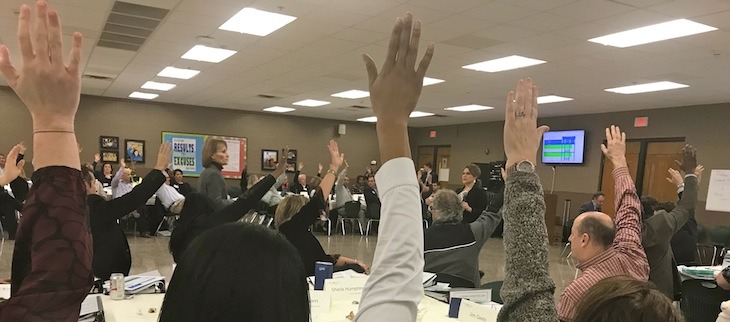Fort Smith citizens committee sends almost $120 million in school expansion, improvements to school board
by February 8, 2018 11:48 pm 2,592 views

Members of the citizens committee voted Thursday night (Feb. 8) on several Fort Smith Public School District improvement items. The plan will now be presented to the Fort Smith Public School Board.
A group of 52 Fort Smith residents gathered Thursday (Feb. 8) for the fifth – and last time – to craft an improvement plan and associated funding level for broad improvements to the Fort Smith Public School District. The almost $120 million plan approved by the group would add 6.888 mills to the 36.5 millage rate in the district.
School officials have said their goal is to get a Fort Smith School Board plan to voters for the May 22 primary election.
The process began Jan. 11, with the citizens committee learning about the mechanics of school funding, studying previously identified needs, reviewing the millage process and working toward consensus in balancing between what the district might need and what it could afford. Several signs on the Chaffin Junior High School cafeteria wall encouraged the citizen group to “pursue consensus.” The group deliberated for almost four hours on items ranging from a multi-million dollar new ninth grade center to an estimated $65,000 for a power protection replacement system.
Prior to Thursday, the citizens committee had eliminated several expansion and improvement options, including a new auditorium at Southside High School and a new career and technology center at Northside High School. Additions and renovations at Ramsey, Kimmons, and Chaffin Junior High School were also removed from the list during previous group meetings.
‘BEST SOLUTIONS’
In opening comments at Thursday’s meeting, Fort Smith Public Schools Superintendent Dr. Doug Brubaker challenged the group to have a “high degree of confidence” in the proposal that would emerge. Alma Molleur, process moderator from Round Rock, Texas, challenged the group to put aside personal preferences and consider doable solutions.
“This is not about winning and losing. This about collectively finding the best solutions for this community,” Molleur said.
Zena Featherston Marshall, Fort Smith Public School’s director of communication and community partnerships, said the process following Thursday’s meeting includes a Feb. 26 school board meeting during which Jason Green, an executive at Baldor/ABB in Fort Smith and representative of the citizens committee, will present the consensus plan.
A consensus plan almost didn’t happen. After more than three hours of discussion, debate and voting, the process hit a rough patch when an error in the baseline millage was discovered. Committee members were operating under the belief they had already approved projects adding 4.215 mills. However, school officials found an error that pushed the previously approved projects millage to 5.25 mills.
The group agreed to revote on each item. A $43.824 million (1.924 mills) expansion at Southside High School and a $34.696 million expansion at Northside High School each received support with a 40-10 vote. A $1.821 million expansion at Morrison Elementary was approved 38-10, while a more extensive $6.053 million expansion at Morrison was rejected 10-38.
Adding seven nurses to the district (0.281 mills) was approved by the committee with a 33-17 vote.
‘TRANSPARENT PROCESS’
Prior to Thursday’s final citizens’ committee meeting, the group approved the following large projects.
• New career and technology center, $13.724 million (0.602 mills)
• Renovations at Darby Junior High School, $9.665 million (0.424 mills)
• Expansion at Barling, Cook and Woods Elementary schools, $8.545 million (0.375 mills)
• Safety, security and lighting system upgrades at several schools, $5.5 million (0.241 mills)
Less costly items approved include a grant writer, a 1.34% base raise for teachers, and three school resource officers.
Before the almost four-hour meeting ended, all items approved were packaged into a single vote. There were no objections to that final vote.
Brubaker thanked the committee for their many hours of time and effort, saying the staff and Board would now “get it to the threshold where we think it can be a winner.”
Rep. George McGill, D-Fort Smith, and a Fort Smith mayoral candidate, attended the meeting. He told Talk Business & Politics he was impressed with the “transparent process.”
“They (school officials) called in these citizens and they have had a big say in determining what they think is really needed,” McGill said. “So you have this transparent process with close to 60 people from a broad cross section of the community … work this process to better our (school) district which is so vital to our economic growth.”
MILLAGE RATE COMPARISONS
According to Arkansas’ Assessment Coordination Division, the average millage rate in Sebastian County is 39.27 mills. If the citizens committee plan were approved without change, the Fort Smith School District millage would rise to 43.388 mills. County millage rates range from 44.13 mills in Pulaski County to 29.25 mills in Lee County.
The millage rate in Fort Smith is now below that of other districts in Sebastian County. Following are millage rates for other districts in the county or partially in the county.
• Booneville, 40.2
• Charleston, 37.5
• Greenwood, 40.6
• Hackett, 38
• Lavaca, 41.9
• Mansfield, 40.01
In neighboring Crawford County, the millage rate ranges from 43.4 in Alma to 36 in Cedarville. The Van Buren school millage is 42.6.
